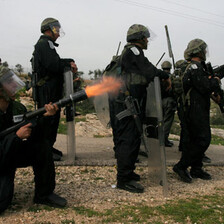The Electronic Intifada 8 July 2008
RAMALLAH (IPS) - Ambulances were again prevented Monday from entering the central West Bank village of Ni’ilin, near Ramallah, to evacuate the ill and the wounded. Supplies of medicines were running low, as confrontations continued with youths defying a four-day-old curfew imposed by the Israeli military.
The Israeli army had surrounded the village and ordered residents to remain indoors and was also preventing the media from entering Ni’ilin, said Salah al-Khawaja, spokesman for the Ni’lin Committee for Resisting the Separation Barrier.
Following intense media coverage and a meeting between the Ni’ilin Village Committee and the Israeli army, the curfew was lifted Tuesday morning. But the protestors have refused to give up the fight for their land or committed to ceasing demonstrations.
The blockade followed fierce clashes last Friday which broke out between the army and several hundred Palestinian villagers, international activists and Israeli sympathizers, protesting the continued expropriation of village land. Four Israelis were amongst those arrested.
“On Friday over 20 protestors were injured by beatings, rubber-coated bullets and tear gas inhalation,” Hindi Mesleh, a protest organizer presently stuck in the village, told IPS by phone.
“Last night the army entered the village at 2am and started shooting sound bombs in front of all the village homes,” he added.
An Israeli army spokeswoman said that the village was being placed under indefinite curfew due to “increased violence by the protestors.”
On Friday, she said, demonstrators threw rocks and rolled burning tires towards Israeli border policemen guarding the wall, wounding one person and damaging a jeep.
Protesters, however, accused the soldiers of excessive brutality and shooting at demonstrators unnecessarily. A number of demonstrators have suffered serious injuries at previous bi-weekly demonstrations.
These injuries have included fractured skulls from rubber bullets (marble-sized metal balls covered in half a millimeter of rubber) and beatings from batons.
The villagers of Ni’ilin have been fighting what they call a land-grab by Israel, which has seen the size of their village reduced from 5,700 hectares of land in 1948 to 3,300 hectares in 1967, to the present approximate 1,000 hectares.
The army plans to establish an Israeli military base on the expropriated land as well as continue building the barrier. But the varrier is diverging off the internationally recognized Green Line — which separates Israel proper from the West Bank — and dividing farmers from their crops, despite a ruling by the Israeli high court last year directing the Israeli military to re-route the wall.
According to international law and UN resolutions, Israel’s continued settlement building on Palestinian land in the West Bank, designated as part of a future Palestinian state, is illegal. There are approximately 430,000 Israeli settlers residing illegally in the West Bank.
“This is both a violation of international law and a violation of human rights,” Sarit Michaeli, spokesperson for the Israeli human rights organization B’Tselem told IPS.
B’Tselem together with another Israeli human rights organization Yesh Din successfully petitioned the Israeli high court last month to temporarily halt settlers from the Ofra settlement, near Ramallah, from enlarging their settlement on land taken from the nearby Palestinian village Ein Yabrud.
“The government partially acknowledged the illegality of the building which in turn prompted the court’s interim ruling,” said Michaeli. “We are waiting a final ruling next week.”
However, the human rights groups have faced off against very determined settlers.
So determined in fact, that Rabbi Avi Gisser expedited construction by breaking Halakha or Jewish law by ordering building to continue seven days a week, even on the Sabbath, in order that connection to water and electricity infrastructure would be completed so that settlers could occupy the buildings before the court’s intervention.
Israel also faced strong criticism from US Secretary of State Condoleezza Rice, a usually uncritical stalwart of Israel, during her recent visit.
“I do believe that the actions and announcements that are taking place are having a negative effect on the atmosphere for negotiations,” Rice said at a news conference.
Rice also expressed frustration at the Israeli housing ministry’s announcement, while she was in Jerusalem, of plans to build 1,300 more homes in Ramat Shlomo, a settlement on Palestinian land in east Jerusalem.
Israeli Foreign Minister Tzipi Livni said in response to Rice’s criticism that Israel had “no hidden agenda” in regard to West Bank settlements. She also said that “the settlements would not pose an obstacle to the implementation of the Road Map peace.”
Shortly before Rice’s trip Israeli Prime Minister Ehud Olmert approved a plan to build 750 new homes in the Givat Zeev settlement and 100 new homes in the Ariel settlement in the northern West Bank. Five hundred homes are currently under construction in Har Homa and 240 in Maaleh Adumim in East Jerusalem.
This came in spite of the Israeli leadership assuring the US administration, during the Annapolis, Maryland peace talks last year that they would halt illegal settlement building.
But just how seriously the US administration is taking this issue is open to question. Confusion has shrouded the issue ever since US President George W. Bush told Israel in 2004 that the US would not oppose big Jewish population centers remaining on contested land. As a result, Israel also intends to hold on to the three major settlement blocks in the West Bank.
While the US may be confused over the issue, the Palestinians are clear where they stand in regard to international law and further peace talks.
Palestinian Authority President Mahmoud Abbas stated categorically that the settlements were “the biggest hurdle” to peace talks while Palestinian negotiator Saeb Erekat made it clear that East Jerusalem is a red line for the Palestinian negotiating team which cannot be crossed. He added “that Israel agreeing to cede only 90 percent of the West Bank will not suffice,” and has demanded the return of 98 percent.
All rights reserved, IPS - Inter Press Service (2008). Total or partial publication, retransmission or sale forbidden.




